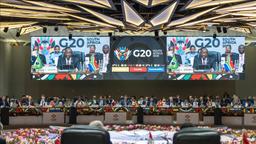
TEPAV, acting as the co-chair of the "Trade, Investment, and Growth" and "Migration and Young Societies" task forces, presented three policy proposals.
The Think Tank 20 (T20) engagement group, as part of its activities under the Group of 20 (G20), has released policy briefs covering a wide range of topics under the T20 task forces.
Representatives of these leading think tanks, who are members of the T20 in G20 countries, have prepared and shared policy brief documents. More than a 100 policy proposals under 11 task forces were developed to act as points of reference to the Group of 20 (G20) process. The T20 policy briefs are available on the T20 Saudi Arabia website: https://t20saudiarabia.org.sa/en/briefs/Pages/default.aspx
Accordingly, the Economic Policy Research Foundation of Turkey (TEPAV), acting as the co-chair of the "Trade, Investment, and Growth" and "Migration and Young Societies" task forces, presented three policy proposals.
The Need for WTO Reform: Where to Start in Governing World Trade?
This policy brief propounds that the World Trade Organization (WTO) faces an existential crisis and that its main functions are eroding. Its rulemaking function must be revised to govern the current trade environment. Its dispute settlement system, particularly the Appellate Body, has been in deadlocked; the impasse must be resolved. However, reform is not an easy process in a member-driven institution where consensus is strictly required. This policy brief provides recommendations for the initial steps that the G20 can take to support WTO reforms.
You may read the policy brief from here.
Integration of Migrants as a Three-Way Process and its Implications on the Future of Training and Education
This policy brief argues that the G20 faces two pressing issues. While the average age of G20 members is rising, its economies are simultaneously transforming because of technological advancements. Consequently, G20 countries are unable to meet the growing domestic demand for skilled workers. The policy brief proposes establishing innovative skill-building schemes in countries-of-origin together with G20 destination countries with whom a long-standing migratory relation exists. While allowing destination countries to meet the demand for skilled workers via immigration, this initiative would expedite migrants’ integration into host countries and help improve the quality of domestic labor in migrant-sending countries.
You may read the policy brief from here.
Local Leadership: Preparing for the Future of Work and Fostering Immigrant Inclusivity
This policy brief underlines that there are two sources of competition in the labor markets of G20 economies: modern technology, which is changing the future of work, and immigration – a long-standing phenomenon recently becoming heavily politicized. The two sources of competition share a common denominator; the notion of “us vs. them,” all the meanwhile being amplified by the severe consequences of COVID-19, especially in developing nations. The policy brief scrutinizes the impact of technology, immigration, and COVID-19 on the labor markets of developing economies and sets forth several policy recommendations to bridge the gap between birth rights and human rights while emphasizing the role of local leadership in the form of city-based local actions since all of the aforementioned subjects are urban issues.
You may read the policy brief from here.




